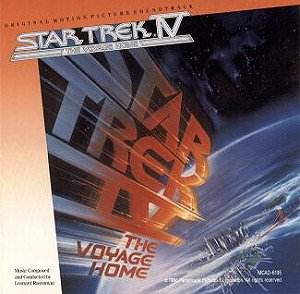| **************************************************************
EDITOR’s RECOMMENDATION November
2000
************************************************************** |
Leonard
ROSENMAN
Star Trek IV: The Voyage Home
 OST
OST
 MCA MCAD-6195
[36:11]
MCA MCAD-6195
[36:11]
Amazon
USA

Leading among the film industry's most doubted composers is Leonard Rosenman.
When he made his grand entrance in 1955 his music was fresh and spellbinding.
Now a rising number of collectors and devotees dismiss this style as
anachronistic and annoying. Popular hits on the radio may be freely recycled,
re-mixed and played unceasingly until a new fad comes along, but continuity,
individual innovation and warranted repetition are points film music composers
such as Rosenman and John Barry have trouble selling. This does not excuse
covers for sheer laziness (when a composer bothers with a cover at all),
but there are times when our cynicism places composers at a prejudiced
disadvantage.
Rosenman's Oscar-nominated "Star Trek IV: The Voyage Home" allows little
neutrality. Listeners tend to praise or denounce it, hardly ever reacting
indifferently or going, "Ooo, umm, undecided," sure testimony of how
extraordinary memorable it is. The greates compositions offer challenges;
those who accept the challenges find themselves somehow moved positively,
and those who resist become furious at the composer's brazen communications.
Thought-provoking music has no go-between.
Others dislike this "Star Trek" soundtrack because it is not Jerry Goldsmith
or James Horner. Of course. Rosenman's effort is the most original of the
"Trek" movie scores, and potentially the most serviceable and distinct one
this side of "Star Trek: The Motion Picture." The heroic main title march
is very light, baroque, almost Christmas-y, and sounds with handsome vigor
and verve. There are key sequences that recall the versatile approach of
the original television series, namely a faux Russian dance for Chekov's
attempted escape from U.S. detention and a delightfully silly tune perfectly
matched to a decidedly out-of-the-ordinary hospital chase. Contrast comes
from serialism and atonality for the probe and time travel scenes. Then the
score bows to '80s culture with two selections co-composed and performed
by The Yellowjackets jazz ensemble. But the high point comes from the classically
rapturous 'Whale Fugue,' the motion picture's exultation as the whales swim
into the ocean and save Earth -- one of the most glorious images in science
fiction film, in part due to the composer's emphasis on simple joy. This
music is fantastically different.
A couple of complaints are easy to understand: the recording quality is thin
and the underscore inadequately presented. Similarities to Rosenman's own
"The Lord of the Rings" could raise Spock's brow, as well. Still, love it
or hate it, the score is entirely the composer's doing. How many film soundtracks
from the past two decades can we say that about?
The album works best in narrative order (1, 10, 8, 3, 7, 6, 9, 2, 4, 11 and,
optionally, 5). Hear exactly what Rosenman got so wrong -- but why hear as
a contentious challenge what is a call to adventure? -- and so right.
Jeffrey Wheeler

![]()
![]()
![]()
![]()
![]()
![]()
![]()
![]()
![]()
![]()
![]()
![]()
![]()
![]()
![]()
![]()